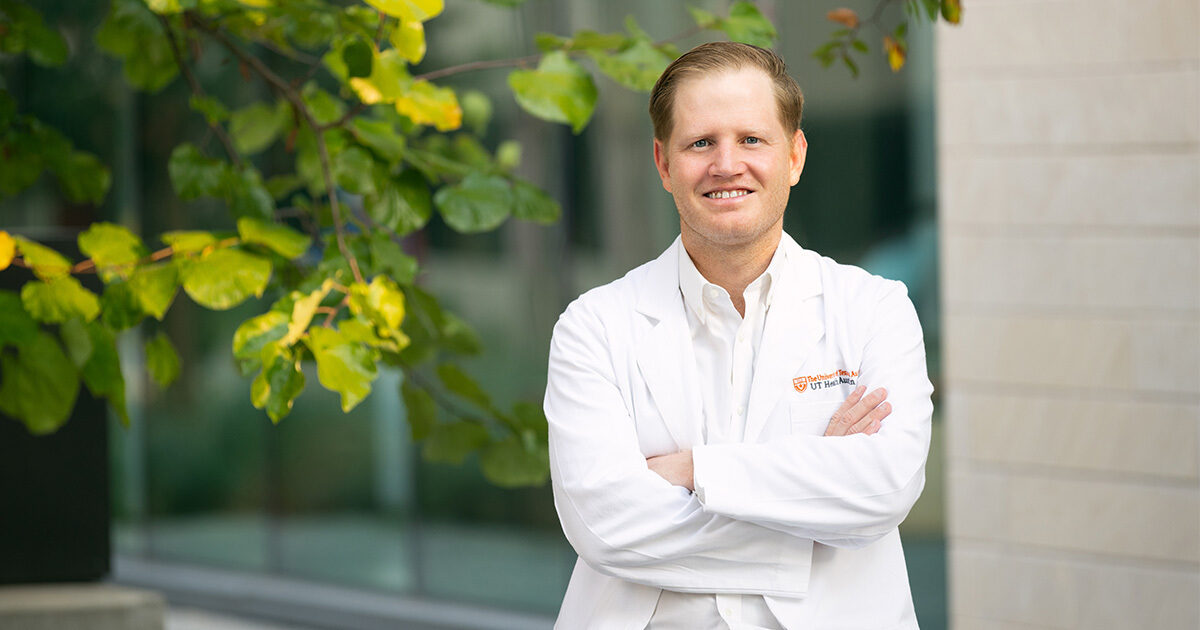New Surgeon to Expand Endocrine Care in Central Texas
One of Austin’s only fellowship-trained endocrine surgeons joins UT Health Austin’s Surgical Oncology Clinic
Reviewed by: Samuel E. “Rhett” Long, III, MD, FACS
Written by: Lauren Schneider

The highest level of specialty surgical care is more accessible now than ever in Central Texas with the arrival of Samuel E. “Rhett” Long, III, MD, FACS, a fellowship-trained endocrine surgeon in UT Health Austin’s Surgical Oncology Clinic. Dr. Long is one of the only surgeons in Austin to specialize in cancers and other conditions affecting the endocrine system, a set of structures that produce hormones to send messages to other bodily tissues.
While it is not uncommon for local surgeons to treat endocrine disorders as part of their broader practice, few have dedicated their practice solely to endocrine surgery, largely because the region lacked an academic medical center until 2017, when UT Health Austin opened as the clinical practice of the Dell Medical School at The University of Texas Austin.
“Surgeons who wish to focus exclusively on endocrine conditions often gravitate towards academic medical centers because it requires both medical and surgical expertise that can be hard to maintain in the setting of a more general practice,” explains Dr. Long.
Explore the values that define UT Health Austin’s mission as an academic medical center.
<br>The Broad Impact of Endocrine Dysfunction
This new role at UT Health Austin marks a homecoming of sorts for Dr. Long, who completed a residency at Dell Medical School in 2018. He credits his mentors within the program with guiding him towards his eventual specialty.
“The endocrine system stood out to me because it involves the entire body in a complex feedback process, which profoundly impacts people’s lives,” shares Dr. Long. “For example, the thyroid gland makes thyroid hormone, which is critical in regulating your metabolism and energy levels as well as your gastrointestinal, cardiovascular, and skeletal systems.”
Other structures of interest to Dr. Long include the parathyroid glands, which release parathyroid hormone to control blood calcium levels; and the adrenal glands, which secrete hormones such as cortisol, a stress hormone; adrenaline, which is involved in the fight or flight response; aldosterone, which helps regulate blood pressure and androgens, which are precursors to sex hormones estrogen and testosterone.
“Most patients that I see either over-secrete or under-secrete particular hormones due to a condition involving an endocrine gland,” says Dr. Long. “Autoimmune conditions, tissue damage, cancerous tumors, and benign cell growths, known as nodules, that develop on endocrine organs can dysregulate the levels of hormones these structures produce.”
Endocrine conditions treated at UT Health Austin include:
- Adrenal cancer: A malignant tumor that forms on the adrenal glands
- Adrenal nodules and tumors: Abnormal growths on the adrenal gland that are usually not cancerous
- Hyperparathyroidism: When one or more parathyroid glands secrete too much parathyroid hormone, leading to excessive levels of calcium in the bloodstream
- Hyperthyroidism: When the thyroid gland produces excessive thyroid hormone, which can have widespread impact on almost every organ system in the body
- Thyroid cancer: An abnormal malignant cell growth that develop in the thyroid gland
- Thyroid nodules: Abnormal growths of tissue that form on the thyroid gland that are usually not cancerous
Endocrine Care Tailored to Your Needs
Patients with an endocrine cancer or other endocrine conditions are referred to Dr. Long for a consultation if their primary care physician or endocrinologist feels their condition would be best addressed through surgery. “While hyperthyroidism is often initially managed with medication, some of the medicines may have toxic effects if used for a prolonged period,” explains Dr. Long. “In such cases, a surgical consultation may be recommended for the patient.”
“A surgical consultation does not always lead to an operation,” notes Dr. Long. “We evaluate the patient’s medical endocrine condition in the context of their overall health and work with the patient to determine if they are a good candidate for surgery.”
In some instances, Dr. Long may determine that a patient’s condition should be treated without surgery, in which case he can transfer care to another endocrine specialist. If a patient has trouble accessing an endocrinologist, Dr. Long can help them manage their condition medically until such a provider becomes available.
Other patients may not be deemed a good candidate for surgery due to underlying health issues, such as severe diabetes, or cardiopulmonary conditions that may have negative effects during general anesthesia. These cases require close coordination with the patient’s primary care doctor, pulmonologist, and/or cardiologist to determine if and how surgery can proceed.
Many of Dr. Long’s patients who do undergo surgery can be treated at UT Health Austin’s Ambulatory Surgery Center (ASC), a dedicated facility for outpatient and select short-stay procedures. At the ASC, patients receive surgical care in the same convenient downtown Austin location as their preoperative and postoperative appointments at the Surgical Oncology Clinic.
“The ASC is an extremely efficient, detail-oriented, and overall incredible place to work,” says Dr. Long. “The staff are capable and friendly, the facilities and equipment are top notch, and overall, my patients are very happy with their care.”
Meet Joel, a patient of the Surgical Oncology Clinic who was treated for melanoma at the ASC.
<br>Regardless of the eventual course of action, Dr. Long’s priority is finding a treatment that works for each patient as an individual. “As a specialty, endocrine surgery is unique in how it draws from both medical and surgical approaches to care,” shares Dr. Long. “Endocrine surgeons are by nature very detail-oriented and methodical, and our job is to find the best solution for each patient.”
For more information or to schedule an appointment with the Surgical Oncology Clinic, call 1-833-882-2737 (1-833-UT-CARES) or visit here.
For more information about the Ambulatory Surgery Center, visit here.
If you’re a physician interested in performing surgery at the Ambulatory Surgery Center, please call 1-855-352-2900 for more information.